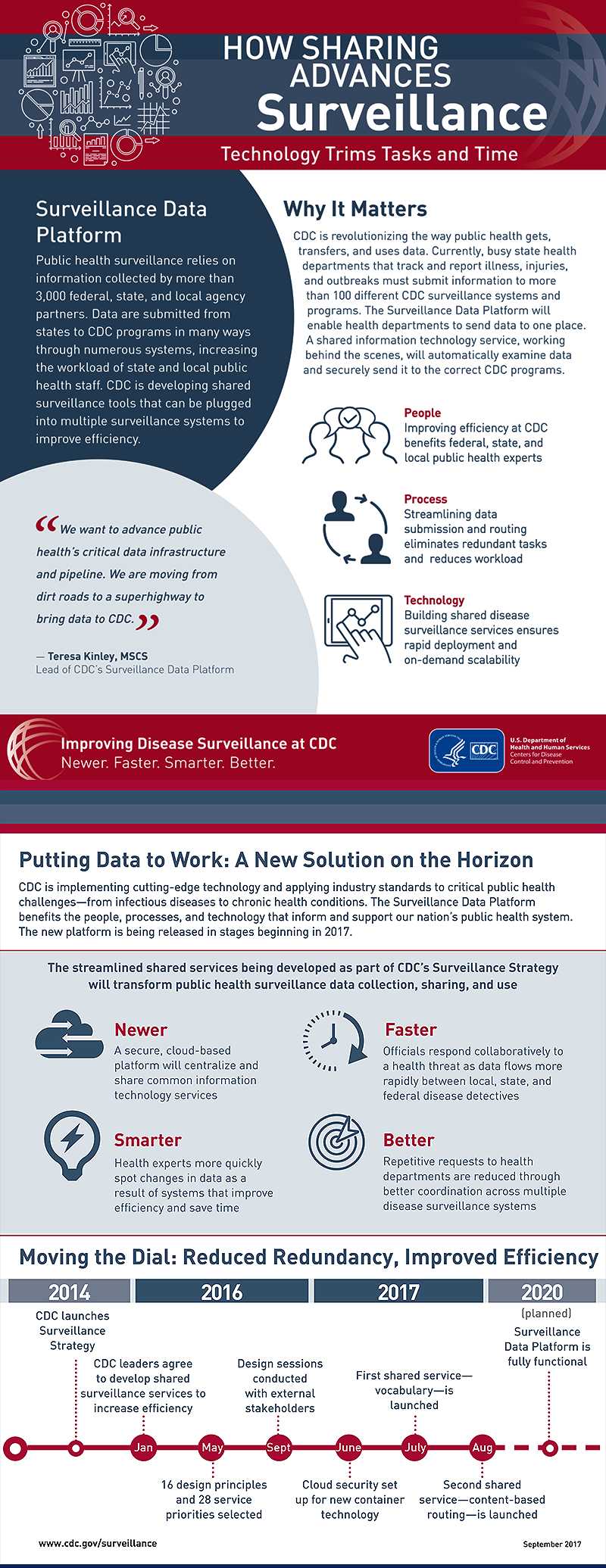How Sharing Advances Surveillance
Text Equivalent
How Sharing Advances Surveillance
Technology Trims Tasks and Time
Surveillance Data Platform
Public health surveillance relies on information collected by more than 3,000 federal, state, and local agency partners. Data are submitted from states to CDC programs in many ways through numerous systems, increasing the workload of state and local public health staff. CDC is developing shared surveillance tools that can be plugged into multiple surveillance systems to improve efficiency.
Why It Matters
CDC is revolutionizing the way public health gets, transfers, and uses data. Currently, busy state health departments that track and report illness, injuries, and outbreaks must submit information to more than 100 different CDC surveillance systems and programs. The Surveillance Data Platform will enable health departments to send data to one place. A shared information technology service, working behind the scenes, will automatically examine data and securely send it to the correct CDC programs.
-
People
Improving efficiency at CDC benefits federal, state, and local public health experts -
Process
Streamlining data submission and routing eliminates redundant tasks and reduces workload -
Technology
Building shared disease surveillance services ensures rapid deployment and on-demand scalability
“We want to advance public health’s critical data infrastructure and pipeline. We are moving from dirt roads to a superhighway to bring data to CDC.”
— Teresa Kinley, MSCS Lead of CDC’s Surveillance Data Platform
Putting Data to Work: A New Solution on the Horizon
CDC is implementing cutting-edge technology and applying industry standards to critical public health challenges—from infectious diseases to chronic health conditions. The Surveillance Data Platform benefits the people, processes, and technology that inform and support our nation’s public health system. The new platform is being released in stages beginning in 2017.
The streamlined shared services being developed as part of CDC’s Surveillance Strategy will transform public health surveillance data collection, sharing, and use.
-
Newer
A secure, cloud-based platform will centralize and share common information technology services -
Faster
Officials respond collaboratively to a health threat as data flows more rapidly between local, state, and federal disease detectives -
Smarter
Health experts more quickly spot changes in data as a result of systems that improve efficiency and save time -
Better
Repetitive requests to health departments are reduced through better coordination across multiple disease surveillance systems
Moving the Dial: Reduced Redundancy, Improved Efficiency
2014 CDC launches Surveillance Strategy
2016
Jan—CDC leaders agree to develop shared surveillance services to increase efficiency
May—16 design principles and 28 service priorities selected
Sept–Design sessions conducted with external stakeholders
2017
June—Cloud security set up for new container technology
July—First shared service—vocabulary—is launched
Aug— Second shared service—content-based routing—is launched
2020 Surveillance Data Platform is fully functional (planned)
September 2017
- Page last reviewed: September 28, 2017
- Page last updated: September 28, 2017
- Content source:


 ShareCompartir
ShareCompartir
